June 10, 2017
Click here for the full written transcript of this podcast episode.
Thousands of books have been written about the latest and greatest diets that will help people lose weight and improve health. But a key element in any successful nutritional health program is a tried-and-true method that most people haven’t thought about—yet it could be revolutionary for taking health to the next level. This ancient secret is fasting.
Fasting is not about starving oneself.
When done right, it’s an incredibly effective therapeutic approach that produces amazing results regardless of diet plan. In fact, Toronto-based nephrologist Dr. Jason Fung has used a variety of fasting protocols with more than 1,000 patients, with fantastic success.
Dr. Fung earned his medical degree at the University of Toronto, where he also completed his internal medicine residency before heading to the University of California, Los Angeles, for his fellowship in nephrology. He currently practices as a kidney specialist in Toronto. He is the chief of the department of medicine at Scarborough General Hospital. In addition to clinical medicine, he is also on the board of directors of Low Carb Diabetes Association and the scientific editor of the Journal of Insulin Resistance. During the course of treating thousands of patients, it became clear to Dr. Fung that the epidemic of type 2 diabetes and obesity was getting worse.
The prevailing dietary recommendations to reduce dietary fat and calories were clearly ineffective. He founded the Intensive Dietary Management Program to provide a unique treatment focus for type 2 diabetes and obesity: rather than focusing on medications, this clinic focuses on dietary changes that are simple yet effective.
In The Complete Guide to Fasting: Heal Your Body Through Intermittent, Alternate-Day, and Extended Fasting, he has teamed up with international bestselling author and veteran health podcaster Jimmy Moore to explain what fasting is really about, why it’s so important, and how to fast in a way that improves health. Together, they make fasting as a therapeutic approach both practical and easy to understand.
During our discussion, you'll discover:
-Why Jason and Ben have different takes on whether or not to eat breakfast…[8:25]
-The five different physiological stages of fasting…[16:45]
-Why growth hormone actually goes up, not down, when you fast, and how the body uses this mechanism to maintain muscle…[30:15]
-Why fasting doesn't actually decrease your metabolic rate or cause you to go into to starvation mode…[33:20]
-What kind of scenario would actually cause your metabolic rate to decrease with calorie restriction…[37:10]
-Why most of the Biggest Loser contestants actually regained their weight after the show…[44:35]
-The reason hunger gradually disappears during a fast…[49:55]
-The shocking things that happen to your body when you do an extended fast…[56:35]
-What refeeding syndrome is…[63:00]
-And much more…
Resources from this episode:
–The link between circadian rhythm and eating breakfast
Show Sponsors:
Ample – Ample is a balanced healthy meal in a bottle with 20+ superfoods. Use code GREENFIELD for 15% off all first-time orders.
TeloYears – Go to BenGreenfieldFitness.com/TeloYears and use my special gift card code BEN10 to get 10% off your TeloYears kit. Code valid through Aug 31, 2017.
Hello Fresh – For $30 off your first week of deliveries, visit HelloFresh.com and enter code FITNESS30 when you subscribe!
Marc Pro – Marc Pro: Pain Relief and Faster Muscle Recovery Time. For a 5% discount, use promo code “BEN” at marcpro.com.
Do you have questions, thoughts or feedback for Jason or me? Leave your comments below and one of us will reply!



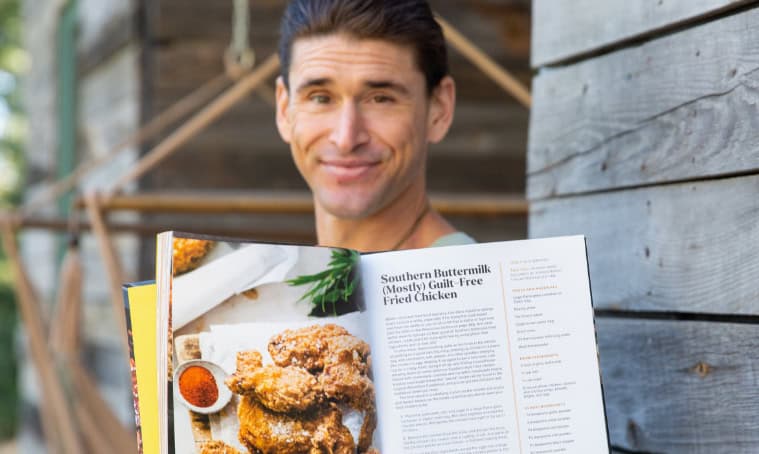
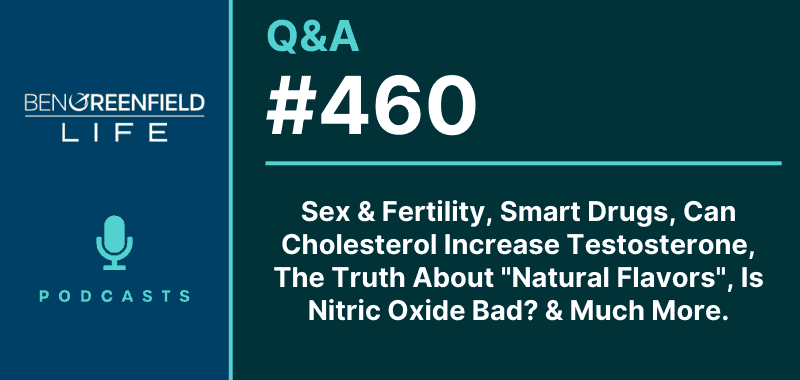
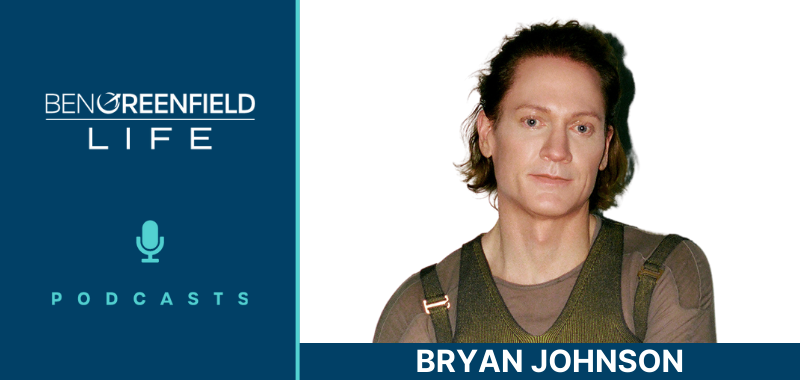

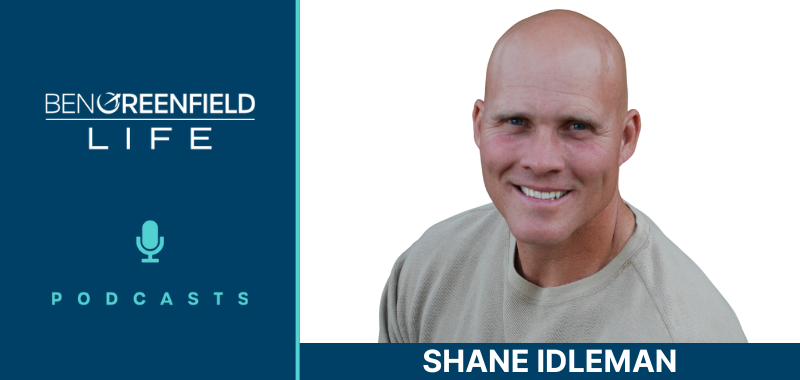



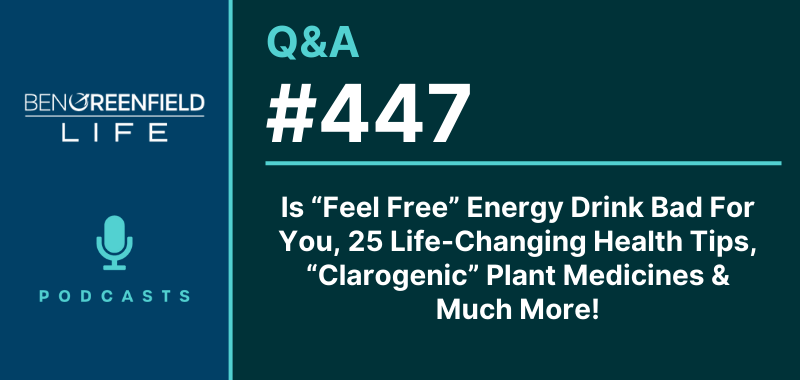

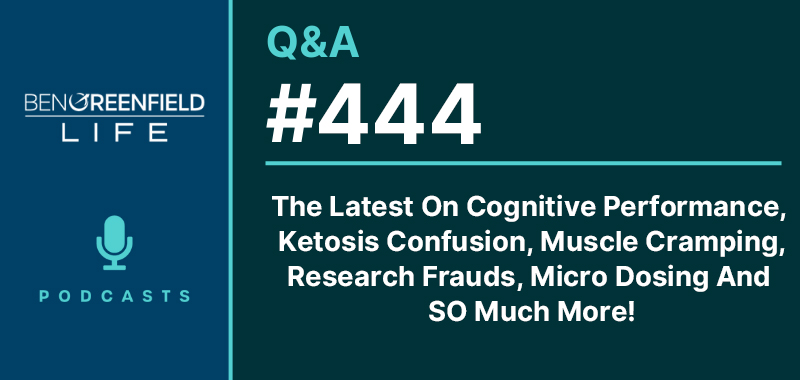
Hi! Great podcast ! Just a couple of questions:
1) Should fasting be meant as an alternative to caloric restriction or would it be better combine them, eating less even in our eating window ? In this case how can we know when to stop eating ? I’m normal weight and moderately athletic student.
2) During 16/8 fasting protocol and prolonged fasting, how is it possible to prevent muscle loss?
Thanks a lot
Hi Luca, I would download Kion's free fasting guide here: https:/ <a href="http:// /https://getkion.com/fasting/” target=”_blank”> <a href="http:///https://getkion.com/fasting/” target=”_blank”>/https://getkion.com/fasting/ If you still have questions, try asking the Kion Facebook community. https://facebook.com/groups/getkion
Hey Ben, is there still a way to access kion fasting guide? The link doesn’t work anymore
Jason’s audio is a little distracting as his volume is erratically up and down and almost muted at times. Otherwise great talk!
Ben, maybe I missed it, but I’ve been doing 16/8 IF for close to a couple years now, and after listening to this, I’m going to start doing some 24 hr fast a couple times a month. What should we eat after our fast? Protein shakes? Thanks
Just eat normally. I do daily 16’s with a 24 every Wednesday.
Thank you for the informative podcast and the great supplements! Love kion aminos. I was wondering if you guys had any advice on chewing nicotine gum during the fast. Will this cause and insulin’s response thus affecting the bodies ability to run on stored fat. Also, possibly affecting cell atophagy? I usually fast 17-20 hrs daily. The sugar alcohols are sorbitol, malitol, and sucralose.
Here's an article about that: http://siimland.com/can-i-chew-gum-while-fasting-…
Do nicotine lozenges support or detract from a 5 day NCLF?
Hi, can one have a spoon of coconut oil during the fast
I’m accustomed to doing a 16-20 hour daily fast. Can you comment on why the 12-16 hour window is better than 16-20 or 24 hour+ both in terms of weight loss and longevity? As my body is accustomed to this IF time now, I often don’t even feel hungry until at least 16 hours but am wondering if this is more detrimental than if I were to fast longer/shorter.
I'm not sure that a 12-16 hour is superior. I find that personally, with how active I am, 16 hours is about as long as I like to go without eating. I usually do intermittent 12-16 throughout the week, then I like to do 24 hour fast from Saturday night to Sunday night 2-4 times a month.
I just listened to your podcast with your guest, Dr. Fung. I thought you said that I could get a copy of his book for free at your website. Can’t find the link… Help!
Not free, but you can buy it here on Amazon: https://amzn.to/2KnDVHu
Does a “sugar free, carb free, calorie free” energy drink break a fast?
It's hard to say without knowing what's in it, which is why I typically stick to black coffee while fasting.
Two questions
1) does having cinnamon in said coffee break the fast?
2) does eating non caloric supplements such as Qualia break the fast?
Many thanks
No, wouldn't worry about those two.
I am about to be diagnosed diabetic on wed. I read the diabetic code and i am interested oin n the intermittent fasting. I also have high blood pressure. How do I do the fasting.
Hello, Ben
I find it easy to consume 1200 calories a day as I am doing Ketogenic diet and intermittent fasting.
I eat from 7 to 10pm and I do a little cycling session of 30mins a day.
And on the weekend I am spiking my caloric intake to about 4000calories a day- 60%fat 35% protein.
Would you suggest a change or an addition to that protocol to lose fat?
As a note, I am doing the fasting mainly to tighten my skin because I use to weigh 145kg and now I am at 74.5kg, and I am 178cm.
What are your thoughts on this study that came out earlier in the year where the results of alternate-day fasting and calorie restriction were roughly the same? http://jamanetwork.com/journals/jamainternalmedic…
Doesn’t surprise me at all. Both are just different forms of calorie restriction if done correctly.
Hi
I do shift work. I work 12 hours in 3 days, have 4 days off but have a very hard time becoming a day shift person afterwards. I have lost and gained 40lbs at least 3 times in my life. I am 57 years old. How do I structure this diet to accommodate this schedule? Fast on night shift or day shift etc?
Thanks so much.
Hi Ben! Thanks for all the awesome podcasts! Question: Two people are doing a 5 Day water fast looking specifically for autophagic effects and benefits, both 5 foot 9 inches in height, the first one is slender and 150 pounds. The second one is overweight and 300 pounds. Since the first person has very little body fat for his body to burn, will he get a substantially greater amount autophagy than the second person? For example will the 300 pound person have to fast for 10 days to get the same autophagic benefits than the 150 pound person would get by fasting for 5 days?
Yes, the first person will get more of a longevity effect while the latter person will get more of a weight loss effect.
Good evening
Just started the fasting process and I have experienced a 5 day fast in the past that allowed me to relieve the symptoms of IBS. I am a type 2 diabetic and take hypertension and cholesterol medication. I am wondering on our non fasting days are we allowed to eat fruits of any sorts. If so which ones do you recommend.
This is an awesome book.
Thanks
Kerny
Yes, although you do want to be careful with excess fructose on the non-fasting days, so I wouldn’t do much more than 1 piece of fresh, raw fruit per day!
I’m an ultaendurance athlet. I’d like to begin one day fast. How long do i have to stop before my next race in one month ? Cause I think a fast to close to the race will alter the performance isn’t it?
You can fast for a day as close as seven days prior to your race and still be just fine as far as your glycogen stores are concerned. You should definitely read Dr. Jason's book too.
[Sorry, I think I entered this question already, but on the transcript page. Please ignore the other one!]
Hey Ben & Jason:
A little late to the game here, but I have 2 questions:
1. If it takes about 24 hours to run out of glycogen, and another 12 hours to transition through burning protein via gluconeogenesis (plus also apparently still burning some leftover glycogen) all the way to more complete fat-burning state around hour 36—AND if the Randle cycle dictates that it is difficult (impossible?) to burn fat and glycogen at the same time—then doesn’t this mean we don’t burn fat until hour 36? If so, how can there be fat-burning benefit to shorter, intermittent daily (e.g. 16/8) fasts? What am I missing?
2. So you make a strong case that there is no net LOSS to muscle mass from fasting, assuming you follow up the fast with protein intake. But if you do strength training in the middle of an extended fast, is there any mechanism for muscle GROWTH? If so, where does the protein for growth come from if I strength train in a fasted state and remain fasted after a workout?
THANKS for a super informative episode!
1. He recommends a LCHF diet in conjunction with intermittent fasting. Thus, once you are fat adapted with a LCHF diet, 16 hrs is enough to deplete the very little carbs you consume (normally, less than 20grams daily).
Hi Ben & Jason,
Great podcast! I really enjoyed and have done 2 fasts since listening (and took a re-listen during the first fast). My question was if I’m able to weight train during the fasts? I was aiming for approximately 55 hrs for the fasts (from after dinner Sunday and break the fast Wednesday Morning), but this conflicts with my training schedule. I thought that the uptick in growth hormone would be helpful if I’m lifting on Tuesday, but I wasn’t sure if it would be less effective/catabolic to not be replenishing the body with protein after the workouts. Would you recommend just having a protein shake after the workout and continuing on with the fast, skipping the protein, or doing a less intense workout? Any thoughts or best practices?
Thanks,
Andrew
Hi, great podcast! Anything to change with this protocol for women?
Does the book address coming off an extended fast, what to eat? Not to eat?
Thanks for all the help. Finishing up a 7 and 3/4ish day Gerolsteiner water fast tomorrow. I didn’t have any spiritual breakthroughs but I lost a decent amount of fat. The second day was probably the hardest like I have heard but hunger was not overwhelming for the majority of time but it never really went away like others have experienced. It was kind’ve like doing a bunch of one day fasts all in a row. Not hungry in the morning but thought about food/hunger in the afternoon/evening. I’m thinking about breaking it with an avocado. Then mabye some steamed broccoli or a soft boiled egg a couple hours later. Does this sound reasonable? I don’t want to overdo it. How long before I have a normal solid meal? Thanks for all the great podcasts.
Great podcast. Definitely enjoyed it. Find it very interesting that a nephrologist recommends fasting. My nephrologist tries to get me to avoid it. (I lost a kidney while in the military). Would love to discuss the implications on kidney health w/ Dr. Fung. Keep up the great work.
Is it safe to have blood drawn for a comprehensive blood test like wellness fx premium at the start or during a 7 day water fast? Thanks for the help.
Also, should I avoid intense exercise like sprints or resistance training. Or would that help maintain muscle during the fast?
Thanks!
Also, would adding a small amount of milk of magnesia to gerolsteiner create extra magnesium bicarbonate or does that only work with plain soda water?
You know, I'm not quite sure. I know that if you added something like magnesium citrate to it it probably would but I'm not quite sure if milk of magnesia would do the same thing…
Very brief bouts of resistance training have been shown to be able to maintain muscle mass even in a low calorie intake state. High intensity interval training, on the other hand, may actually cause you to lose some muscle. So I would stick with "lifting heavy stuff" in moderation.
I am not a doctor and this is not to be taken, interpreted or construed as medical advice. Please talk with a licensed medical professional about this. These are just my own personal thoughts and not a prescription or a diagnosis or any form of health care whatsoever.
The sample size for the draw is a very small amount of blood and you should be just fine. It's less than a quarter of the amount you would give even if you were donating blood…
Hey Ben, I’m interested in doing an extended fast for 5 days. I was wondering if there is anything I should be doing differently because I am around 6-7% body fat. I would also like to maintain my muscle as much as possible. Am I safe to go with coffee, water, electrolytes, BCAA’s and multivitamin?
Also I’m guessing work outs and running would be much lighter than usual?
Thanks,
That is a very low percentage body fat so I would not medically recommend a fast of that length. You can still do it, but there would be no medical reason to do so.
Hello Ben,
Great podcast as always. question do EAA or BCAA have an effect on fasting? I read they are good during the fast especially with working out. As jeremy above mentions and i know you are big proponent of amino acids. i recently heard that EAA/BCAA cause an insulin response, so that would break an intermittent fast? do you have any info on if that is true or not?
Thanks
There is a relatively non insulinogenic effect of EAA's. BCAA's high in leucine can slightly break fast but it's very, very slight. I wouldn't worry about it.
Most amino acids do have an insulin response. Anything other than water technically breaks a fast, but most health benefits still accrue.
What about people with thyroid issues? What i have heard is that fasting or any caloric restriction with decrease the output of thyroid hormones. This could be a problem in people with already low thyroid hormones.
Hi Ben and Dr. Fung, fantastic podcast!
One interesting point to highlight is the flexibility during the feeding window. For example, once the 16hr fast concludes, you can essentially enjoy your lunch at 12pm, breakfast at 3pm (e.g., 5-7 eggs with almonds, etc.), followed by a grueling workout in the evening and healthy dinner with plenty of healthy macro and micro nutrients. Important to note, anyone trying IF needs to dial-in on their diet to avoid breaking their fasts with foods in the high-glycemic index (e.g., white bread, muffins, donuts, etc.). Nice to enjoy every now and then, but don’t make it a habit to introduce these whilst experimentation with IF.
Therefore, skipping a meal is not necessary – you can simply defer it to later to fuel your workouts! Of course, that’s the beauty of IF, you can do whatever works for you! When I first tried IF, ghrelin would kick in around 9am and last about 30minutes. Now, ghrelin kicks in during the 8-hour feeding window only.
Hello, Ben. You have a transnasal light therapy device advertised on your website. Have you done, or will you do a podcast on that? Also, there is a visual stimulation therapy study that was done by MIT http://news.mit.edu/2016/visual-stimulation-treat… This was pretty impressive, yet I can find no such accurate 40hz light device to play with. Thanks!
Yes, I've already done one here: https://bengreenfieldfitness.com/2015/10/intranas… let me know if you have any more questions!
Thanks! Will do!
Great podcast! I do have a question that I’ve been reading mixed reviews on. I’m doing 16/8 fasting now along with the ketogenic diet – if I consumed coffee in the morning with a tsp of coconut oil or bulletproof coffee does this break my fast? I know it has calories but I’ve read mixed things about it! Thanks – keep up the awesome work!!
Hi Schanel, great question! Admittedly, I have tried butter and coconut oil in my black coffee a handful of times, though I normally drink my morning coffee black – without adders. Here are a few of my N=1 observations when I did add 1 Tblsp of organic butter and 1 Tblsp of organic coconut oil: (1) Induced higher level of ketosis ~ 0.833 to 1.11 mmol/L. Normally, it takes much longer to hit these markers with pure fasting and black coffee; (2) Subjective feeling of more energy, though perhaps a placebo effect; (3) natural chap stick with oily lips in the morning; and (4) Accelerated bowel movements (eek). Tip: You can grab some ketone strips from your local pharmacy to test for ketosis or if you’re very serious about ketosis, suggest you get the blood test kit. I recall Ben talking about using a breath ketone meter as his preferred method. Reminder that ketosis is not the same as the commonly mistaken dangerous state of ketoacidosis.
All this being said, I honestly feel it’s better to have my coffee black (with cinnamon) and enjoy small amounts of butter later in the day with real food, especially after a tough workout.
For my friends who enjoy Martin’s Intermittent Fasting (“IF”) protocol (16/8), heed to his advice and stay away from butter and MCT oil in your coffee! Why? Well because your consuming energy and breaking your fast with lots of calories! Simply enjoy your coffee black, and actually enjoy the way it tastes. I don’t know about you guys, but eating sticks of butter and coconut oil seems like a dumb trend.
This is a variant called 'fat fasting'. The point of fasting is to lower insulin and pure fats like coconut oil have little effect on insulin despite the calories.
Hi Ben. What about drinking something like coffee with butter and MCT oil during the day? Does that break the fast?
It’s complicated and depends on your goals for your fast but technically anything with calories will break a fast.
Cheers, brilliant episode, really helped me get my head around a few things i hadn’t manage to nail properly ^^
Hi Ben,
Thanks for a great podcast. I found this topic really interesting and I have a couple of questions.
With the release of growth hormone during fasting, does that mean that hypertrophy is possible if combined with strength training? Does it matter what stage of a fast you train? Eg. If you are on a 16/8 fast where you don’t eat breakfast, is hypertrophy going to occur best in the morning during the fast or in the evening when you’ve eaten? Also are there benefits to high intensity training compared to low intensity training mid fast?
There is an argument against fasting that when you break your fast your body stores extra calories for the next time your fast; has this been de-bunked or is that because people re-feed incorrectly or does this have to do with the growth hormone again.
Yes – this is called training in the fasted state. Fast for 24 hours and do your workout at the end. During fasting, noradrenalin goes up as does growth hormone. This allows you to train harder and recover faster. Eat after workout to provide needed protein.
One potential problem with IF is the re-feeding window. Pubmed and other sites have research that shows when people re-feed during a limited window, hormonal levels are negatively affected. If you’re trying to consume 1800 or more calories across several meals in eight hours or less, insulin surges (as do cortisol and higher levels of LDL also result) thus offsets the benefits gained during your fasting window. Hence, the recommendation some researchers make to keep insulin levels lower by eating smaller meals throughout the day, which people are familiar with.
Also, multiple studies indicate that performance can suffer during fasting. eg Gleeson M, et al. Influence of a 24-hour fast on high-intensity cycle exercise performance in man. Eur J Appl Physiology, 1988; 57: 653–659
MDs such as Dr. David Ludwig, MD**, an endocrinologist at Harvard Medical School, suggests caution if one is interested in using IF and notes information similar what I noted previously: “In a classic feeding study, volunteers were given the same calories either as many small meals (Nibbling) or as a few big meals (Gorging) each day. The Nibbling group showed better blood lipid and glucose levels, and lower stress hormone production. So at least under some conditions (especially, a high carbohydrate diet), restricting calorie intake to just a few hours a day can have negative effects.” https://www.drdavidludwig.com/intermittent-fastin… (**For those not familiar with Ludwig’s work, his research identified/confirmed how “high GI” carbs actually slow one’s metabolism.)
What are your thoughts on fasting and Candida- could the Candida become more powerful or is the 36 hours enough to balance out the body if so any recommendations on supplements? Also what about fasting for females is there a preferred time of the menstrual cycle to fast on?
Thank you! I have been waiting for dr. To be on your show. Love both of your dedication to health.
Fasting has little to do with Candida. Fasting can be done at any time in the menstrual cycle. It is just a myth that women should not fast (excepting if underweight, pregnant or breastfeeding).
love this podcast. In fact i started fasting right after i listened to it, i am at 23.5 hours! im hoping to make 36 but im getting shakey and feel a bit woozy… tips? suggestions? i fought through the afternoon hunger-although to be honest i did take a bite of my daughters string cheese… did that ruin my fast? ive only had coffee and some matcha besides the cheese… I have about 90lbs i need to lose and nothing seems to click with me, this does, but i need some support with it… can i/should i do two 24-36 hr fasts a week? i dont see how i could do a 3 day one especially preparing food for the kids- too many temptations! (single mother btw) thank you, love everything you do
It often takes 1-2 weeks of consistent fasting to get your body acclimated. It is easier if you start with a low carbohydrate diet. It's like a muscle – the more you use it, the stronger it gets.
Great episode. Ben, similar question to one of the above, but what do you think about working out at lunch fasted on a 18/6 IF?
Should I supplement with EAA, or just eat before the workout (12pm) and fast for a shorter amount of time? I’ve tried the shorter fasts, but they don’t seem to do as much.
Depends. If you want to stave off catabolism, the answer is yes, I’d use EAA’s prior to the workout. I personally do just 12 hour fasts and DON’T use that approach, saving EAA’s for very long or difficult workouts…these: https://greenfieldfitnesssystems.com/product/natu…
I highly enjoyed this episode! Such a simple concept that hasn’t been embraced by traditional health ‘authorities.’ I also felt motivated to not eat haha!
Hi Ben, do you have articles I could reference on how eating first thing in the morning doesn’t actually jump start your metabolism ?
Start here, and let me know if you have any questions. https://bengreenfieldfitness.com/2013/12/diet-myt…
I know everyone is different but skipping breakfast and fasting until lunch destroyed my circadian rhythm which manifested itself in the worst insomnia you could imagine. It took over 6 months to resolve after resuming normal eating patterns. The research coming out definitely backs up the fact that food in light in the morning sets your clock correctly. Skip dinner instead!
HEllo- curious to see if you e clocked the percentage of people that you alone consult with that have a thyroid condition? Maybe lots or maybe your group isn’t a good example of general society cross section.. but it would have been interesting (and I would say highly relevant in today’s ‘epidemic’ of thyroid dysfunction to mention thyroid and fasting… just putting it out there..
He kept dancing around the stress response by labeling it ‘autoregulatory’ which I’m assuming is meant to make it sound benign.. but let’s just review: sympathetic domainace (which is what you’re promoting with this for some people) isn’t wonderful.. especially with a thyroid condition.. also- cortisol, insulin resistance.. discuss :)
I love your work and I learn a lot from them. I need transcripts though that I can follow as you do the podcast. For example I looked for the transcript in the transcript section of your website for your podcast with Dr. Fung and I didn’t find it.
Thank you so much for all you do.
Transcripts are posted shortly after the podcast- check back for it!
I’ve seen full body photos of Dr. Fung and he is ‘not’ chunky in the slightest. Perhaps an eye exam is in order before you bad mouth someone else? Take a look at mainstream RD’s and other ‘health professionals who push the SAD diet for obesity.
Ever wonder why so many low carb pundits are chunky like Dr Fung or down right obese? Im a great believer in the benefits of fasting, but Im in the Ray Cronise, Neal Fuhrman camp on diet. If keto diets were great for weightloss, Jimmy Moore would be slim.
Can one strength train and do cardio while on a prolonged fast?
What type of supplements and calories free drinks can one use while fasting?
Yes, you can do any type of exercise, although there is a 2-3 week adaptation phase where your muscles optimize burning of fatty acids for energy instead of glucose where you may be weaker than usual. A general mutlivitamin is all I recommend. I don't recommend any artificial sweeteners or flavors. Tea, water, coffee is best.
Jason and Ben, great and informative podcast! I just wanted to ask a question about the sympathetic nervous system aspect of fasting. It’s almost as of fasting is a “stress” on the body, but an important stress like exercising. So would intermittent fasting lead to autonomic nervous system imbalance because of the constant sympathetic stimulation? I have a lengthy family history of heart disease and am trying to use diet and exercise to not only maintain physique and performance but to also keep my autonomic nervous system and its effects on the heart in check. Thanks for any information you can provide!
Yes, fasting is a stress on the body, but it is intermittent, not constant. Intermittent stress (fasting, exercise) is generally beneficial where chronic stress (marital problems, money issues) are detrimental.
Glenn – During a fast you could try some breathing exercises for maintaining balance of sympathetic/parasympathetic NS. Heart rate variability and breath work is a great idea for about any time. There are some great apps for this.
Hey Ben, I am curious if supplementing with EAAs when doing a 16/8 daily eating window and a weekly 24 hour fast as you’ve discussed previously minimizes the benefit of muscle breakdown and growth hormone induced rebuilding when refeeding post fast which you talked about in this episode?
It all depends. If you are looking for peak athletic performance, then supplements may be necessary. I generally treat overweight/ obese type 2 diabetics, who aren't much concerned about performance. For them, supplements are not necessary.
Ben,
Loved the show! Who would have thought that a show on fasting could be so informative! My question is about type 1 diabetics (and non-over weight type 2 diabetics) how can they experiment with fasting safely? And is it even recommended for them? I’m guessing the average endocrinologist won’t be onboard.
Thanks!
It is much trickier for type 1s because you need to adjust insulin dosage properly. You cannot simply hold insulin. It is possible, but most endocrinologists couldn't be bothered with the extra monitoring needed.
What is your opinion about fasting whith high cortisol and thyroid issues?
Yes, fasting represents a stress on the body and results in an increase in counterregulatory hormones (sympathetic system activation, noradrenalin, growth hormone and cortisol. Yes cortisol. Thyroid hormone is minimally involved here. The point you miss is that intermittent stress (eg. exercise) can be very healthy. Fasting is not a chronic condition. If it were, yes, it would be unhealthy, too.
Really great podcast today! Does juice fasting offer the same or similar benefits or should that be looked at as a totally different endeavor?
Hi Ben,
Could you please talk about dry fasting at some point. Majority of the religions engage in dry fasting and many people claim it has much higher health benefits compared to water fasting.
–The Complete Guide to Fasting never talks about it in the book.
I don't generally recommend it. There are almost no scientific studies on dry fasting. From my clinical experience, most find dry fasting much harder than regular since you are both fasting and becoming dehydrated. Some claim that water is liberated from fat stores (like a camel) but I don't think this has been well studied enough to say yes or no. It is possible. Since there is little medical benefits to avoiding water, I don't generally recommend dry fasting.
Hi Max, I’m working in Kazakhstan on a construction project at the moment and there are tons of folks fasting during the month of Ramadan. Many of my colleagues wake up at 3am to drink ridiculous amount of water and food to prepare for the dry fast. Due to the regional location of the country, they are able to break the fast around 9:30pm, though unable to consume anything from 3:30am-9:30pm (18hrs). Some even train right before breaking their fast – they claim to feel light and strong. I’m not sure I could train after 18hrs of fasting, at least not without some BCAA’s!
I have to agree with Ben, water is super important otherwise the health risks associated with dehydration will tax your nervous system too hard. If you fast for religious purposes, you simply don’t have a choice unless of hardship or sickness. But if you try a dry fast for the sake of it, not a good idea, especially if you decide to train.
Juice fasting way more different and really not healthy at all. It's basically like shoving tons of fructose into your bloodstream all at once
Would this be true for a vegetable juice fast also?